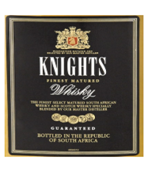The Supreme Court of Appeal in South Africa recently handed down the appeal judgement in the Distell case, a decision of the Kwazulu Natal High Court. Appeal Judge Lewis wrote the judgement and four other SCA judges concurred.
Briefly, Distell Limited produces and sells cheap whisky under the brand KNIGHTS (website here). The most relevant trade mark that they own is trade mark registration number 91/3863 KNIGHTS (it is unfortunately not clear from the judgement but this is actually a device mark where KNIGHTS appears on a plain black label together with the crest and five circle device) registered from 30 October 1990 covering alcoholic beverages. It was also common cause that Distell had a reputation in the mark.
KZN Wine & Spirits CC import BLACK KNIGHT whisky and sell it in the midlands of Kwa-Zulu Natal. It is also relatively cheap.
Distell make a claim for trade mark infringement S34(1)(a) and passing off and lose in the high court, and are refused leave to appeal. The SCA then grants them leave to appeal.
The labels as they appear in the marketplace, according to the judgment, are as follows:
Citing relevant local (including Plascon Evans and Cowbell) and international case law (Sabel v Puma) the court analysed the various tests to be applied for trade mark infringement. Distell argued that the lower court had erred by placing emphasis on a consumer that was discerning and, as a result, that there was no likelihood of confusion. Both whiskys are relatively cheap and not necessarily purchased by connoisseurs.
The SCA dismissed the appeal deciding that:
"In my view, one cannot ignore the use of the word black to describe KZN Wines’ whisky. Knight is used as a noun, and the adjective describing the knight is black. Whether the colour black is used to describe a mythical figure (as in the Black Knight of King Arthur’s round table) or to express some quality which many whisky brands use (the example given being Black Label, describing a whisky in the Johnny Walker range, but others abound) does not matter. It simply cannot be ignored. Although Distell tried to argue that knight is the dominant word even in Knight’s Gold, it is hard to see why. Just as black cannot be ignored, nor can gold. As the high court said, the word black was as significant as knight in KZN Wines’ mark."
The Judge makes the bold move that the marks are not even similar:
"The sound, sense and appearance of the respective marks are different. Even the consumer with an imperfect recollection, and in a noisy pub or crowded bottle store, is not likely to be confused as to the origin of BLACK KNIGHT whisky."
Comment:
If the court cites Sabel v Puma it means that it ascribes to that test for comparison on marks. The court then has simply not applied the infringement test correctly. The test for "similarity of marks" under the Sabel v Puma test (as applied) has very little to do with a man in a noisy pub; it simply involves a consideration as to whether there is any level of similarity (as opposed to "likelihood of confusion" - which comes later in the test) between the marks. The question is whether there is any similarity between the marks (as registered by Distell and used by KZN Wines) visually, conceptually and/or orally.
If there is any level of similarity (both marks contain the word KNIGHT, for example), the judge should then because the goods concerned were identical, consider the reputation in the mark KNIGHTS (label) as marks with a reputation have a greater degree of protection. He then should have considered the likelihood of confusion taking into account all relevant factors, including that he had decided that the mark "black" was common and descriptive, the man in the noisy pub, the relevant consumer, the degree of similarity in the marks etc. Had he approached the test in this way, it is difficult to believe that he would have reached the same conclusion.
Having decided that there is no infringement, passing off was hardly entertained. The logic of this seems reasonable in the circumstances but the test for infringement, as explained above, does not appear to have been correctly applied.
edited to reference the mark KNIGHTS as registered.
edited to reference the mark KNIGHTS as registered.










2 comments
Write commentsGreat!
Reply